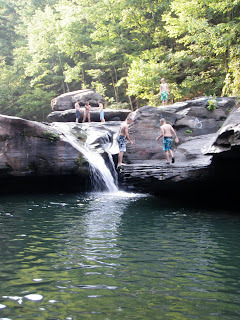land
∞
Minnesota Canvas
I just returned from teaching a monthlong tropical ecology class in Belize and Guatemala. As I flew from Minneapolis to Sioux Falls, I saw this view of the farms below. Farmers and engineers have made firm lines according to the compass points, dividing the land into neat checkerboard squares of farmland bordered by dirt roads. Every section has its woodlot, a dark quadrilateral on a white snowdrifted landscape.
Ignoring the lines laid down by us, the wind has painted over this right-angled landscape. The snow and the soil show where the wind has steadily brushed across the state, patiently unmaking what we have done.
Ignoring the lines laid down by us, the wind has painted over this right-angled landscape. The snow and the soil show where the wind has steadily brushed across the state, patiently unmaking what we have done.
∞
The Moral Issue Of Land
In my daily readings a while back I came upon this:
And this, written by Alan Paton. His younger Jarvis (in Cry, the Beloved Country) also writes prophetically about South Africa. What he says could have been written about any number of places, though:
The question I am pondering this morning: What do love and justice require of us when it comes to land ownership?
This question is made more poignant as our state legislature is considering eliminating perpetual conservation land easements. One argument against them is that it seems unreasonable to put limitations on future people. We may rightly ask: can we consider those people who do not yet exist - and who therefore may never exist - as factors or agents in our moral reasoning?
And yet every time we consume a non-renewable resource we are making an irrevocable decision about what the land will yield for perpetuity. Land easements may be one way to offset the effects of our other decisions, and they are at least reversible if the future proves them foolish.
Jarvis correctly diagnoses us: when we think about the future, frequently we are moved by fear. Isn't that why the prince Ezekiel spoke of was tempted not to give up his land?
I also find that when I think about the future, I am also motivated by love, and that love is perhaps my strongest, my most angelic impulse. I save, teach, build, conserve, and create for my children, and for others like them. I may not be able to give them a better world, but I do feel - I admit it is, at its base, a feeling - that I owe them at least as good a world as I received.
"[The prince] is to give his sons their inheritance out of his own property so that none of my people will be separated from his property." (Ezekiel 46.18)
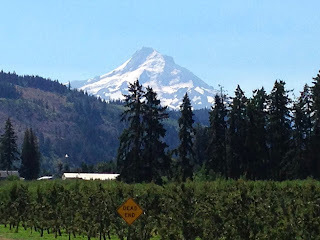 |
| Central Oregon |
And this, written by Alan Paton. His younger Jarvis (in Cry, the Beloved Country) also writes prophetically about South Africa. What he says could have been written about any number of places, though:
"It is true that we hoped to preserve the tribal system by a policy of segregation. That was permissible. But we never did it thoroughly or honestly. We set aside one-tenth of the land for four-fifths of the people. Thus we made it inevitable, and some say we did it knowingly, that labour would come to the towns. We are caught in the toils of our own selfishness....No one wishes to make its solution seem easy....But whether we be fearful or no, we shall never, because we are a Christian people, evade the moral issues."As a child I thought prophets were people who predicted the future, or who spoke things God wanted to say, like spokespeople. As I've grown older, my notion of prophets has expanded to mean those people who disrupt our quotidian secular and economic concerns in order to remind us that love and justice may and must constrain our actions. What could be more important than that?
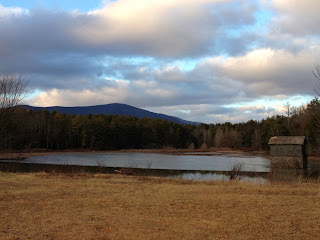 |
| Zena Reservoir and Overlook Mountain |
The question I am pondering this morning: What do love and justice require of us when it comes to land ownership?
This question is made more poignant as our state legislature is considering eliminating perpetual conservation land easements. One argument against them is that it seems unreasonable to put limitations on future people. We may rightly ask: can we consider those people who do not yet exist - and who therefore may never exist - as factors or agents in our moral reasoning?
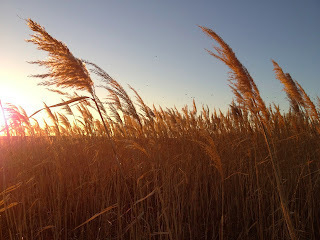 |
| Dakota prairie |
And yet every time we consume a non-renewable resource we are making an irrevocable decision about what the land will yield for perpetuity. Land easements may be one way to offset the effects of our other decisions, and they are at least reversible if the future proves them foolish.
Jarvis correctly diagnoses us: when we think about the future, frequently we are moved by fear. Isn't that why the prince Ezekiel spoke of was tempted not to give up his land?
I also find that when I think about the future, I am also motivated by love, and that love is perhaps my strongest, my most angelic impulse. I save, teach, build, conserve, and create for my children, and for others like them. I may not be able to give them a better world, but I do feel - I admit it is, at its base, a feeling - that I owe them at least as good a world as I received.
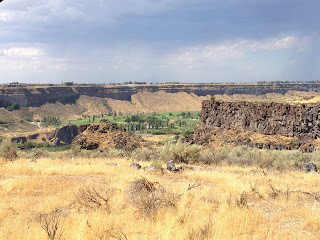 |
| Twin Falls, Idaho |
∞
People Of The Waters That Are Never Still
Generations ago, one of my European grandfathers and one of my Native American grandmothers married, fusing in their offspring two peoples who had parted ways ages before, one heading west to the British Isles, the other to the Bering Strait and across to North America. I grew up in New York, near where they met and married, and my childhood is marked by memories of that land: tall oaks and white pines, deep forests, rocky crags over which the water pours, never still, always the same, always changing. The waterfalls of the Catskill Mountains are a constant presence in those mountains and in my memories. They are the waters of my mothers and fathers, and of my youth.
My family has since lost the languages those ancestors spoke, and this fusion of tribes has adopted the linguistic fusion of English. I have no intention of claiming a legal place among either of the nations from which I am descended, nor even to name them here. But I find that the memory of both, and of the lands they lived on, is rooted deeply in my consciousness of who I am. Last year, while visiting the British Museum, I saw a display of various Native American peoples, including my own. It was the only time a museum has moved me to tears. The words and ways of my forebears may be mostly gone, but they are not forgotten. My father taught me to remember them and what they knew of the land we lived on, and often, while teaching me to know the woods, he would remind me that those woods were old family acquaintances.
Jacob Wawatie and Stephanie Pyne, in their article "Tracking in Pursuit of Knowledge," cite Russell Barsh as saying that "what is 'traditional' about traditional knowledge is not its antiquity but the way in which it is acquired and used." Our word "tradition" comes from Latin roots that mean something like "giving over" or "handing down." Traditional knowledge is knowledge that is a gift from one generation to the next, a gift we give because we ourselves were given it. I am grateful to my father, in ways that I may never have told him - in ways that perhaps words cannot begin to tell - for the traditions he learned and loved and passed on to me. I'm grateful that he has not let me forget.
There is, of course danger in emphasizing one's heritage and one's roots, especially if we make that the source of a distinction between ourselves and others, or a way of diminishing the lives and traditions of others. Just as much as it matters to me that I am from the people of the waters of the Catskills, it matters to me that my ancestors shared those waters with one another, people from two continents recognizing, each in the other, the waters from which both arose.
For all that I have received, for the traditions like waters pouring over the cliffs, gifts like the Kaaterskill Creek, let me give thanks. Let me give thanks with my life, offering to those who come after me, a taste of the sweetness of those same waters.
(Photo: Kaaterskill Creek in New York State)
My family has since lost the languages those ancestors spoke, and this fusion of tribes has adopted the linguistic fusion of English. I have no intention of claiming a legal place among either of the nations from which I am descended, nor even to name them here. But I find that the memory of both, and of the lands they lived on, is rooted deeply in my consciousness of who I am. Last year, while visiting the British Museum, I saw a display of various Native American peoples, including my own. It was the only time a museum has moved me to tears. The words and ways of my forebears may be mostly gone, but they are not forgotten. My father taught me to remember them and what they knew of the land we lived on, and often, while teaching me to know the woods, he would remind me that those woods were old family acquaintances.
Jacob Wawatie and Stephanie Pyne, in their article "Tracking in Pursuit of Knowledge," cite Russell Barsh as saying that "what is 'traditional' about traditional knowledge is not its antiquity but the way in which it is acquired and used." Our word "tradition" comes from Latin roots that mean something like "giving over" or "handing down." Traditional knowledge is knowledge that is a gift from one generation to the next, a gift we give because we ourselves were given it. I am grateful to my father, in ways that I may never have told him - in ways that perhaps words cannot begin to tell - for the traditions he learned and loved and passed on to me. I'm grateful that he has not let me forget.
There is, of course danger in emphasizing one's heritage and one's roots, especially if we make that the source of a distinction between ourselves and others, or a way of diminishing the lives and traditions of others. Just as much as it matters to me that I am from the people of the waters of the Catskills, it matters to me that my ancestors shared those waters with one another, people from two continents recognizing, each in the other, the waters from which both arose.
For all that I have received, for the traditions like waters pouring over the cliffs, gifts like the Kaaterskill Creek, let me give thanks. Let me give thanks with my life, offering to those who come after me, a taste of the sweetness of those same waters.
